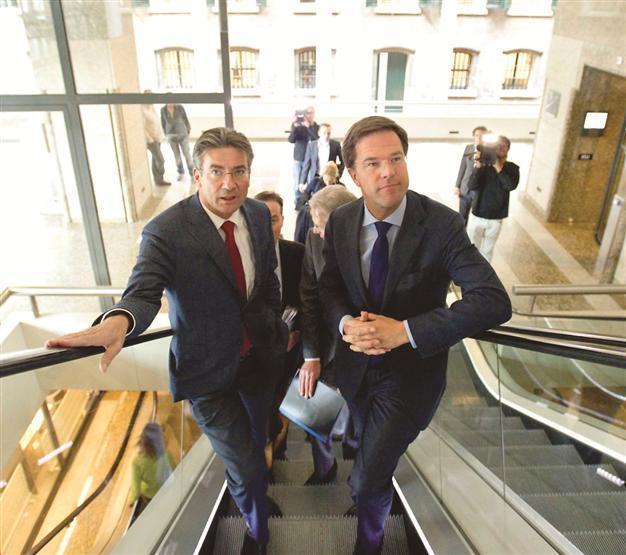Foreign investments by Turks reach $25 billion in 10 years
ISTANBUL - Hürriyet

Dutch PM Mark Rutte (R) and Economy Minister Maxime Verhagen arrive yesterday at a debate about the government’s resignation, caused by a crisis over budget cuts. REUTERS Photo.
Turkish businessmen have invested the highest amount of money in the Netherlands during the first 10 years of the new millennium, according to a report derived from official data by the Confederation of Businessmen and Industrialists of Turkey (TUSKON).Investments in the Netherlands totaled about 20 percent of the more than $25 billion Turkish investments made abroad.
The Netherlands has been famous for its openness to foreign investments and standing as one of only four eurozone countries to still retain its AAA status among the three main credit rating agencies. Yet the country may not keep its position as the top foreign nation for Turkish investments much longer, considering the recent resignation of the Dutch government on April 22 due to disputes over austerity measures with its far-right parliamentary partnership.
President Abdullah Gül paid a three-day state visit to the Netherlands last week with some 100 businessmen, which may offset any economic instability that may stem from future potential political uncertainty in the country.
A total of 3,641 business professionals have started businesses overseas, with some 165 Turkish business professionals have invested $5.3 billion between 2000 and 2010.
Investments in 109 countries
Turkish investments span 109 countries, also giving Turkish businessmen a foothold in some smaller national markets as well.
However, the appetite for foreign investment by businesses in Turkey is largely directed to nearby countries in the energy and banking industries. Some $4 billion of the capital transfer to foreign markets was made by energy investments, while more than $3 billion was spent on banking, followed by $2.5 billion on manufacturing industries. The foreign information technology industry has been a flourishing field for investments, drawing in nearly $2 billion.
According to TUSKON president Rızanur Meral, two main factors are behind growing Turkish investments abroad. “The first [factor] is capital and employment migration, the second is strategic move. Low labor and energy costs are two main reasons for the capital migration. Slowing capital migration will contribute to domestic employment. The new incentive scheme will prevent potential investments abroad by improving domestic conditions on labor and energy costs,” Meral said.
Russia placed second among the countries which attracted the highest amounts of foreign investments from Turkey. Turkish firms invested a total of $3.8 billion in Azerbaijan and $2.5 billion in Kazakhstan. Egypt attracted some $1.5 billion, mostly due to its sprawling textile and automotive sectors.
More than 100 Turkish business professionals invested in 11 countries, namely Northern Cyprus, Germany, Romania, Russia, Ukraine, the United States, the Netherlands, Kazakhstan, Azerbaijan, Uzbekistan and Libya.
Northern Cyprus attracted the largest number of business professionals, hosting 377. Germany attracted 265, followed by Romania, which attracted 247 and Russia with 243.
Dutch prime minister asks help from opposition party
THE HAGUE – Reuters
The Dutch prime minister said his country faced a crisis and asked parliament to push through budget cuts after his government lost the support of its main political ally and tendered its resignation.
But the main opposition parties signaled they would not back the 14 to 16 billion euros savings package he must present to the European Union next week to show the Netherlands is on track to meet its stringent budget limit.
A Dutch bond sale went smoothly yesterday, calming financial markets but investors are waiting to see whether he can find
new backers for the cuts and agree an election date with other political parties.
“Standing still is not good for the Netherlands. The problems are serious, the economy is stalling, employment is under pressure and government debt is growing faster than the Netherlands can afford,” Prime Minister Mark Rutte told parliament yesterday.
The Netherlands must bring its deficit to 3 percent of gross domestic product, the EU’s limit, next year but it is forecast to be 4.6 percent unless extra cuts are made.
















